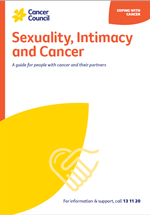- Home
- About Cancer
- Managing side effects
- Sexuality, intimacy and cancer
- Treatment side effects
Treatment side effects
The most common treatments for cancer are surgery, radiation therapy, chemotherapy and hormone therapy. Other treatments you may have include immunotherapy and targeted therapy. You may have just one treatment, or a combination of a few.
Learn more about:
- How cancer treatment affects sexuality
- Surgery
- Radiation therapy
- Chemotherapy
- Hormone therapy
- Immunotherapy and targeted therapy
- Palliative treatment
How cancer treatment affects sexuality
Cancer treatments, as well as the cancer itself, can have temporary or permanent effects on your sexuality by changing:
- your feelings
- the body’s production of the hormones needed for sexual response
- the physical ability to give and receive sexual pleasure
- your body image, how you see yourself, and your level of self-esteem
- roles and relationships.
When you are first diagnosed with cancer, it’s completely natural to feel a range of emotions. These can include grief, anger, anxiety, sadness, fear, guilt, self-consciousness, shame and depression, which can in turn affect your sexuality.
It’s normal to focus mostly just on getting well. As treatment progresses, you may start to notice more effects on your sexuality. These will take some time to adjust to.
To help manage specific concerns, see Overcoming specific challenges.
Podcast: Sex and Cancer
Listen to more of our podcast for people affected by cancer
More resources
Dr Margaret McGrath, Head of Discipline: Occupational Therapy, Sydney School of Health Sciences, The University of Sydney, NSW; Yvette Adams, Consumer; Dr Kimberley Allison, Out with Cancer study, Western Sydney University, NSW; Andreea Ardeleanu, Mental Health Accredited Social Worker, Cancer Counselling Service, Canberra Health Service, ACT; Kate Barber, 13 11 20 Consultant, Cancer Council Victoria; Dr Kerrie Clover, Senior Clinical Psychologist, Psycho-Oncology Service, Calvary Mater Newcastle, NSW; Maree Grier, Senior Clinical Psychologist, Royal Brisbane and Women’s Hospital, QLD; Mark Jenkin, Consumer; Bronwyn Jennings, Gynaecology Oncology Clinical Nurse Consultant, Mater Health, QLD; Dr Rosalie Power, Out with Cancer study, Western Sydney University, NSW; Dr Margaret Redelman OAM, Medical Practitioner and Clinical Psychosexual Therapist, Sydney, NSW; Kerry Santoro, Prostate Cancer Specialist Nurse Consultant, Southern Adelaide Local Health Network, SA; Simone Sheridan, Sexual Health Nurse Consultant, Sexual Health Services – Austin Health, Royal Talbot Rehabilitation Centre, VIC; Prof Jane Ussher, Chair, Women’s Heath Psychology and Chief Investigator, Out with Cancer study, Western Sydney University, NSW; Paula Watt, Clinical Psychologist, WOMEN Centre, WA.
View the Cancer Council NSW editorial policy.
View all publications or call 13 11 20 for free printed copies.

